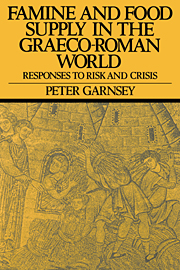Book contents
- Frontmatter
- Contents
- List of tables and figures
- Preface
- Abbreviations
- Maps
- PART I THE INCIDENCE AND SEVERITY OF FOOD CRISIS
- PART II SURVIVAL STRATEGIES
- PART III FOOD SUPPLY AND FOOD CRISIS IN ATHENS C. 600–322 BC
- PART IV FOOD SUPPLY AND FOOD CRISIS IN ROME C. 509 BC – AD 250
- 11 The beginnings of empire
- 12 Rulers of the Mediterranean
- 13 Food and politics
- 14 Rulers of the world
- 15 The subjects of Rome
- CONCLUSION
- Bibliography
- Index
13 - Food and politics
Published online by Cambridge University Press: 12 November 2009
- Frontmatter
- Contents
- List of tables and figures
- Preface
- Abbreviations
- Maps
- PART I THE INCIDENCE AND SEVERITY OF FOOD CRISIS
- PART II SURVIVAL STRATEGIES
- PART III FOOD SUPPLY AND FOOD CRISIS IN ATHENS C. 600–322 BC
- PART IV FOOD SUPPLY AND FOOD CRISIS IN ROME C. 509 BC – AD 250
- 11 The beginnings of empire
- 12 Rulers of the Mediterranean
- 13 Food and politics
- 14 Rulers of the world
- 15 The subjects of Rome
- CONCLUSION
- Bibliography
- Index
Summary
Monthly sales of cut-price grain were introduced into Rome by the state authorities in 123 BC following the passage of the grain law of Gaius Gracchus. They were abolished in 81, remained in abeyance until 73, and sporadically ceased to function in times of civil strife. Otherwise the system operated more or less continuously. However, Rome in the late Republic was by no means free from food crisis. The explanation lies both in the disturbed political climate of the time and in the inadequacy of the distribution system.
FOOD CRISES
In 104, when Saturninus was quaestor, grain rose in price. The senate deprived him of his responsibility for supplies and transferred it to M. Scaurus, the leading senator (princeps senatus). Stung by this insult, Saturninus became a demagogue, according to Cicero.
In 100 the senate authorised the purchase of supplementary stocks of grain. A denarius of this year shows on the obverse the head of Saturn and a serrated sickle, and on the reverse the two quaestors Caepio and Piso seated on a bench, at each end of which there is an ear of corn. The reverse bears the inscription: ‘Ad Fru[mentum] Em[undum] Ex S[enatus] C[onsulto]’ (‘For the purchase of grain following a senatorial resolution’).
This special grain purchase undertaken with senatorial authority may perhaps be seen as the conservative counter to Saturninus' more radical proposal, also of 100 (but some favour 103), to reduce the price of distributed grain from 61.3 asses to 5.6 as per modius.
- Type
- Chapter
- Information
- Famine and Food Supply in the Graeco-Roman WorldResponses to Risk and Crisis, pp. 198 - 217Publisher: Cambridge University PressPrint publication year: 1988



